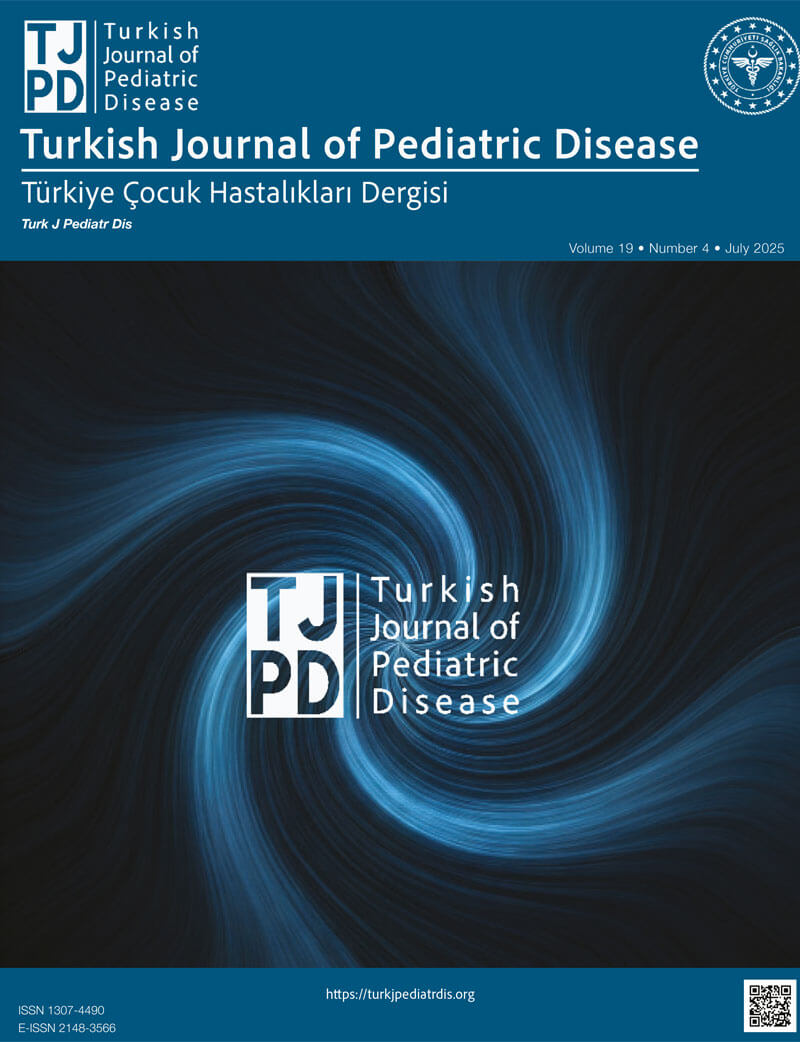Abstract
Objective: Adverse drug reactions, including drug allergies, can be life-threatening and are often unpredictable. Identifying whether reactions are drug-related is critical, and obtaining a detailed history from parents is essential, especially in pediatric cases. This study aimed to assess parents’ awareness of drug allergies and the rational use of medicines.
Material and Methods: A questionnaire was developed to evaluate the awareness of drug allergies among parents of pediatric patients at Ankara Bilkent City Hospital. Additionally, a scale measuring parental attitudes toward rational drug use was used. These instruments were administered to a total of 191 participants.
Results: The study included 191 parent-patient pairs, with an average age of 35±7.5 years for the parents and 6.1±5.6 years for the patients. Chronic illnesses were reported in 52.4% of patients, and 46.6% were on regular medication. A history of drug allergy was noted in 9.9% of patients with antibiotics identified as the most common trigger (68.4%). Parents showed high recognition of skin (89.5%) and gastrointestinal (56%) symptoms but were less aware of respiratory (39.3%) and cardiovascular (16.2%) symptoms. Parents with higher education levels demonstrated a greater awareness that skin symptoms could be accompanied by other system symptoms (respiratory and cardiovascular systems; p=0.004, p=0.001). The average score on the parental attitudes scale was 178.6±14.7, with correct and conscious use and effective and safe use subscale scores of 133±13.6 and 45±7.9, respectively. Higher parental education was associated with better awareness of rational drug use (OR=1.89; 95% CI=1.05-3.42; p=0.030).
Conclusion: Educating parents about drug allergy symptoms and involving them in the management of drug allergies is essential for improving pediatric care outcomes.
Keywords: Children, Drug allergy, Drug utilization, Health attitudes, Medication errors, Nonprescription drugs, Surveys and questionnaires
References
- Dias de Castro E, Barbosa J, Mesquita AM, Caires A, Riberio L, Cernadas JR, et al. Drug Hypersensitivity Quality of Life Questionnaire: validation procedures and first results of the Portuguese version. Health Qual Life Outcomes. 2021;19(1):143. https://doi.org/10.1186/s12955-021-01749-1.
- Tanno LK, Torres MJ, Castells M, Demoly P, Joint Allergy Academies. What can we learn in drug allergy management from World Health Organization’s international classifications? Allergy. 2018;73(5): 987-92. https://doi.org/10.1111/all.13335.
- Dias de Castro E, Carolino F, Ribeiro L, Cernadas JR. Overview of Drug Allergy: From Immunogenetic Basis to Practice. Acta Med Port. 2018; 31(10): 581-8. https://doi.org/10.20344/amp.10092.
- Piccorossi A, Liccioli G, Barni S, Sarti L, Giovannini M, Verrotti A, et al. Epidemiology and drug allergy results in children investigated in allergy unit of a tertiary-care paediatric hospital setting. Ital J Pediatr. 2020;46(1):5. https://doi.org/10.1186/s13052-019-0753-4.
- World Health O. Promoting rational use of medicines : core components. Geneva: World Health Organization; 2002.
- Sarıalioğlu A, Çelebioğlu A. Development of a Parental Attitude Scale for Rational Drug Use. Clinical and Experimental Health Sciences. 2022;12(2):352-9. https://doi.org/10.33808/clinexphealthsci.862272.
- Prosty C, Copaescu AM, Gabrielli S, Mule P, Shoshan MB. Pediatric Drug Allergy. Immunol Allergy Clin North Am. 2022;42(2):433-42. https://doi.org/10.1016/j.iac.2022.01.001.
- Shenoy ES, Macy E , Rowe T, Blumenthal KG. Evaluation and Management of Penicillin Allergy: A Review. Jama. 2019;321(2): 188-99. https://doi.org/10.1001/jama.2018.19283.
- Mendes D, Alves C, Loureiro M, Fonte A, Batel-Marques F. Drug-induced hypersensitivity: A 5-year retrospective study in a hospital electronic health records database. J Clin Pharm Ther. 2019;44 (1):54-61. https://doi.org/10.1111/jcpt.12752.
- Gomes ER, Demoly P. Epidemiology of hypersensitivity drug reactions. Curr Opin Allergy Clin Immunol. 2005;5(4): 309-16. https://doi.org/10.1097/01.all.0000173785.81024.33
- International Collaborative Study of Severe Anaphylaxis. Risk of anaphylaxis in a hospital population in relation to the use of various drugs: aninternational study. Pharmacoepidemiol Drug Saf. 2003;12(3): 195-202. https://doi.org/10.1002/pds.822.
- Panesar SS, JavadS, de SilvaD, Nwaru BI , Hickstein, L Muraro A, et al. The epidemiology ofanaphylaxis in Europe: a systematic review. Allergy. 2013; 68(11): 1353-61. https://doi.org/10.1111/all.12272.
- Büyük Yaytokgil Ş, Selmanoglu A, Kulhas Celik I, Emeksiz ZŞ, Giniş T, Karaatmaca B, et al. Evaluation of the frequency and characteristics of drug hypersensitivity reactions in hospitalized children: Real life-cohort study. World Allergy Organ J. 2024;17(4):100893. https://doi.org/10.1016/j.waojou.2024.100893.
- Demoly P, Adkinson NF, Brockow K, Castells M, Chiriac AM, Greenberger PA, et al. International Consensus on drug allergy. Allergy. 2014;69(4):420-37. https://doi.org/10.1111/all.12350.
- Fingleton NA, Watson MC, Duncan EM, Matheson C. Non-prescription medicine misuse, abuse and dependence: a cross-sectional survey of the UK general population. J Public Health (Oxf). 2016;38(4):722-30. https://doi.org/10.1093/pubmed/fdv204.
- Öztürk S, Başar D, Özen İ C, Çiftçi A. Socio-economic and behavioral determinants of prescription and non-prescription medicine use: the case of Turkey. Daru. 2019;27(2):735-42. https://doi.org/10.1007/s40199-019-00311-1.
- World Health O. The world medicines situation. 2nd ed. Geneva: World Health Organization; 2004.
- Ofori-Asenso R, Agyeman AA. Irrational Use of Medicines-A Summary of Key Concepts. Pharmacy (Basel). 2016;4(4):35. https://doi.org/10.3390/pharmacy4040035.
- Mi X, Li W, Zhang L, Li J, Zeng L, Huang L, et al. The drug use to treat community-acquired pneumonia in children: A cross-sectional study in China. Medicine (Baltimore). 2018;97(46):e13224. https://doi.org/10.1097/MD.0000000000013224.
- Kemal LK, Abebe RB, Sendekie AK, Zeleke TK, Mehari EA, Mekonnen GA, et al. Rational prescribing and dispensing of oral dosage forms of medicines to children: an observational study. BMJ Paediatr Open. 2024;8(1): e002431. https://doi.org/10.1136/bmjpo-2023-002431.
- Çiğdem Z, Bi̇ner BŞ, Yavaş Çelik M. Evaluation of the Attitudes of Parents Whose Children are Hospitalized Towards Rational Drug Use: A Cross-Sectional Study. Turkiye Klinikleri J Nurs Sci. 2024;16(3):669-80. https://doi.org/10.5336/nurses.2023-100673.
Copyright and license
Copyright © 2025 The Author(s). This is an open access article distributed under the Creative Commons Attribution License (CC BY), which permits unrestricted use, distribution, and reproduction in any medium or format, provided the original work is properly cited.






